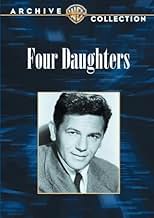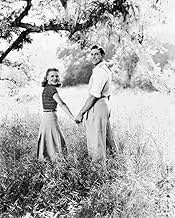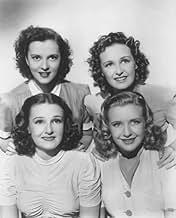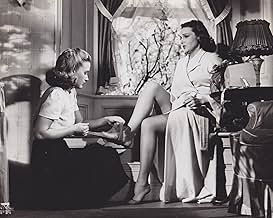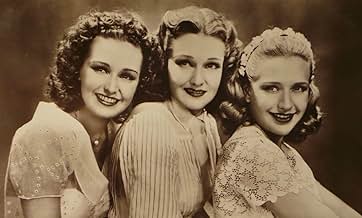Füge eine Handlung in deiner Sprache hinzuA musician is blessed with four musical prodigies, all girls, and cursed when a troubled young composer enters the lives of his daughters.A musician is blessed with four musical prodigies, all girls, and cursed when a troubled young composer enters the lives of his daughters.A musician is blessed with four musical prodigies, all girls, and cursed when a troubled young composer enters the lives of his daughters.
- Für 5 Oscars nominiert
- 5 Gewinne & 7 Nominierungen insgesamt
- Waiter
- (Nicht genannt)
- Mrs. Ridgefield's friend
- (Nicht genannt)
- Doctor
- (Nicht genannt)
- Man
- (Nicht genannt)
Empfohlene Bewertungen
Though Garfield is the main reason to watch "Four Daughters," there are other flashes of brilliance to enjoy. Hungarian-born director Michael Curtiz, later responsible for such gems as "Casablanca" and "Mildred Pierce," pinpoints certain images with his camera (aided by cinematographer Ernest Haller of "Rebel Without A Cause" fame) that sticks in the viewers mind, for example the screeching gate that Ann's first suitor, Felix Deitz (Jeffrey Lynn), swings on so merrily becomes symbolic of the shifts in moods and affections by those who use it.
That Garfield delivers the standout performance is obvious, but the rest of the cast keeps up with him most of the way. The underrated Jeffrey Lynn plays his role to perfection, as the neglected suitor whose love for his cherished Ann never falters even when she's with another man. Claude Rains, somewhat miscast as the father of the four coming-of-age young women, gives a fine portrayal of a set upon doting family head who gets lost in the shuffle. The three Lane Sisters, already famous for their musical abilities, turn into accomplished actresses, playing their parts well. A raft of supporting actors, including Dick Foran, Frank McHugh, May Robson, and Eddie Acuff, makes it all believable.
How opposites attract is part of the ploy for touching the quick of the viewer's imagination. Ann is the eternal optimist, even when she and Mickey are down and out. She always looks on the bright side and like so many caught in the pliers of the Great Depression in those days, she saw prosperity just around the corner. Mickey recites an entire list of bad things that have happened to him seeking company in his misery from Ann, which Ann refuses to do. Mickey expects to go out with a bolt of lightning striking him dead as he rounds the corner of life. Mickey has meager talent as a composer; Ann has talent to spare as a singer and musician. Ann is big on beauty; Mickey is big on personality in a warped sense of a way. And the differences go on and on. How all this is reconciled in the end is an important part of the movie, not to be missed.
See "Four Daughters" for John Garfield's doozy of an acting debut on the big screen. The only time he was better came seven years later when he again mesmerized the film goers with one of the greatest screen performances ever, as Frank Chambers in "The Postman Always Rings Twice," opposite the equally charismatic Lana Turner. But also watch "Four Daughters" to catch important elements that may be missed if too much concentration is placed on the star of the show.
Four Daughter is his first and perhaps his greatest film (Although he is perhaps more famous for his movie "The Postman Only Rings Twice"). Ironically enough, Warner Brothers assumed that this film would shoot Jeffrey Lynn to stardom however, it was John Garfield who became the superstar. Because of Garfield's surprising popularity due to this film, WB quickly put together "Daughters Courageous" with an almost identical cast.
The film centers around four musically talented sisters and their respective romances, though specifically the sister, Ann Lemp (Priscilla Lane) and the two men who love her: John Garfield and Jeffrey Lynn.
John Garfield is explosive as the brooding, cynical composer who pretty much assumes that the "fates" are out to get him (Perhaps the greatest scene in the movie is where Garfield is at the piano explaining to Lane why the fates wouldn't let him win the upcoming music competition that he is composing a song for, "They've been at me now nearly a quarter of a century. No let-up. First they said, "Let him do without parents. He'll get along." Then they decided, "He doesn't need any education. That's for sissies." Then right at the beginning, they tossed a coin. "Heads he's poor, tails he's rich." So they tossed a coin... with two heads. Then, for a finale, they got together on talent. "Sure," they said, "let him have talent. Not enough to let him do anything on his own, anything good or great. Just enough to let him help other people. It's all he deserves." Well, you put all this together and you get Michael Bolgar.") Four Daughters would pretty much be just another "schmultzy" tear-jerker without John Garfield who completely steals the film the moment he enters and it's no surprise that when he died at the young age of 38, his funeral was the most attended celebrity funeral at that time, with more people in attendance than at Rudolph Valentino's.
I highly recommend this movie- the only problem I have with it is the bittersweet ending. If you want a happier movie, albeit cornier, try the Doris Day, Frank Sinatra musical remake, "Young at Heart"
Often I'll run across a film I didn't expect to amount to much and be pleasantly surprised, and this is one of them. Then I see the director is Michael Curtiz who was saddled with directing such diverse films - and quite frankly challenged plots and actors - during his Warner Brothers career, and some of the mystery is unraveled.
The film is about the family of Adam Lemp (Claude Rains), Dean of the Briarwood Music Foundation (nice work if you can get it during the Depression), who apparently makes so much money that he can afford a house that would go for half a million these days, can support four grown daughters, and his sister who never married (May Robson as Aunt Etta). In fact Rains is thirty years younger than Robson, so that would be some age difference for siblings, and what is an esteemed music foundation doing out in Pleasantville, USA?...but I digress.
So the film goes into the relationship between the four sisters - actually three of them ARE sisters - in particular, Emma (Gail Page) and Ann (Priscilla Lane). They vow to be "old maids" together and seem to have a very strong bond. But then enters upbeat composer Felix Deitz (Jeffrey Lynn) into their lives, along with his downbeat friend Mickey Borden (John Garfield), who is doing orchestration for him. That impossible thing we are expected to believe? That Ann falls head over heals for Lynn's character when he projects all of the romantic appeal of a workboot. She seems to feel like Mickey is a work in progress as she tries to lift his IMHO justified downbeat view on life, particularly, his life. So I am expected to believe a vibrant young woman would prefer Lynn's scarecrow like demeanor over the dark brooding Garfield? Well, this was Garfield's first film, so who knew what kind of charisma he would have.
Mickey falls for Ann, Emma falls for Felix (again, why??), and then on the day of her wedding to Felix, Ann finds out Emma loves Felix. Complications ensue.
This film is saved by some really good warm moments between the characters, and Robson always entertains, although it does waste the talents of one of the great actors of the 20th century, Claude Rains. Anybody could have played this part as little as he has to do. It does give you an idea of the kind of burden women had before the 1970s - that it was only acceptable to first live with your parents and then a husband, and if you never married you are forever fifth wheel and housekeeper in your brother's household, and if you temporarily have a career it has to be in something "lady like". How would this film have turned out if the girls had wanted to put on a hard hat and design buildings rather than sing and play instruments? You'll have to wait until the 1970s for THAT kind of film!
Recommended and well acted in spite of it all. And why are the top three billed actors in a film entitled "Four Daughters" all men? Inquiring minds want to know.
Still, it's not hard to understand how anybody who grew up with this picture would remember it fondly. It falls short of being a classic, but it does contain a few classic moments. The two gate swinging scenes are pure movie magic.
Wusstest du schon
- WissenswertesThis movie was John Garfield's first film and earned him his first Oscar nomination for Best Supporting Actor. He would receive one other Oscar nomination for Best Actor in "Body and Soul" (1947).
- Zitate
Mickey Borden: I wouldn't win first prize if I were the only entry in the contest.
Ann Lemp: Mathematically speaking, I think you'd stand a fine chance.
Mickey Borden: You think they'd let me win?
Ann Lemp: Who?
Mickey Borden: They.
Ann Lemp: Who?
Mickey Borden: The fates, the destinies, whoever they are that decide what we do or don't get.
Ann Lemp: What do you mean?
Mickey Borden: They've been at me now nearly a quarter of a century. No let-up. First they said, "Let him do without parents. He'll get along." Then they decided, "He doesn't need any education. That's for sissies." Then right at the beginning, they tossed a coin. "Heads he's poor, tails he's rich." So they tossed a coin... with two heads. Then, for a finale, they got together on talent. "Sure," they said, "let him have talent. Not enough to let him do anything on his own, anything good or great. Just enough to let him help other people. It's all he deserves." Well, you put all this together and you get Michael Bolgar.
- VerbindungenFeatured in Hollywood: The Great Stars (1963)
Top-Auswahl
- How long is Four Daughters?Powered by Alexa
Details
- Erscheinungsdatum
- Herkunftsland
- Sprachen
- Auch bekannt als
- Four Daughters
- Drehorte
- Produktionsfirmen
- Weitere beteiligte Unternehmen bei IMDbPro anzeigen
- Laufzeit1 Stunde 30 Minuten
- Farbe
- Sound-Mix
- Seitenverhältnis
- 1.37 : 1
Zu dieser Seite beitragen




